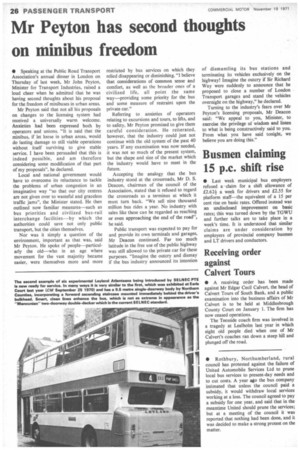Mr Peyton has second thoughts on minibus freedom
Page 28

If you've noticed an error in this article please click here to report it so we can fix it.
• Speaking at the Public Road Transport Association's annual dinner in London on Thursday of last week, Mr John Peyton, Minister for Transport Industries, raised a loud cheer when he admitted that he was having second thoughts about his proposal for the freedom of minibuses in urban areas.
Mr Peyton said that not all his proposals on changes to the licensing system had received a universally warm welcome. Anxieties had been expressed both by operators and unions. "It is said that the minibus, if let loose in urban areas, would do lasting damage to still viable operations without itself surviving to give stable service. I have been persuaded that this is indeed possible, and am therefore considering some modification of that part of my proposals", he declared.
Local and national government would have to overcome its reluctance to tackle the problems of urban congestion in an imaginative way "so that our city centres are not given over to wasteful and graceless traffic jams", the Minister stated. He then outlined now familiar measures—such as bus priorities and civilized bus-rail interchange facilities—by which the authorities could save not only public transport, but the cities themselves.
Nor was it simply a question of the environment, important as that was, said Mr Peyton. lie spoke of people—particularly the old—who in an age where movement for the vast majority became easier, were themselves more and more
restricted by bus services on which they relied disappearing or diminishing. "I believe that considerations of common sense And comfort, as well as the broader ones of a civilized life, all point the same way—providing some priority for the bus and some measure of restraint upon the private car."
Referring to anxieties of operators relating to excursions and tours, to lifts, and to safety, Mr Peyton promised to give them careful consideration. He reiterated, however, that the industry could just not continue with the old system of the past 40 years. If any examination was now needed, -it was not so much of the present system, but the shape and size of the market which the industry would have to meet in the future.
Accepting the analogy that the bus industry stood at the crossroads, Mr D. S. Deacon, chairman of the council of the Association, stated that it refused to regard the crossroads as a terminus at which it must turn back. "We sell nine thousand million bus rides a year. No industry with sales like these can be regarded as reaching or even approaching the end of the road", he said.
Public transport was expected to pay for and provide its own terminals and garages, Mr Deacon continued. Far too much latitude in the free use of the public highway was still allowed to the private car for these purposes. "Imagine the outcry and dismay if the bus industry announced its intention of dismantling its bus stations and terminating its vehicles exclusively on the highwayl Imagine the outcry if Sir Richard Way were suddenly to announce that he proposed to close a number of London Transport garages and stand the vehicles overnight on the highway," he declared.
Turning to the industry's fears over Mr Peyton's licensing proposals, Mr Deacon said: "We appeal to you, Minister, to exercise the privilege of wisdom and listen to what is being constructively said to you. From what you have said tonight, we believe you are doing this."




















































































































